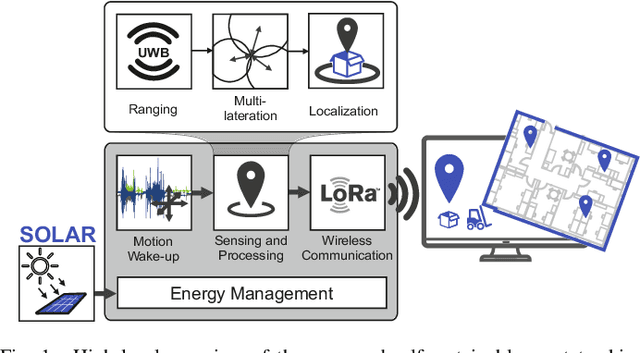Self-sustaining Ultra-wideband Positioning System for Event-driven Indoor Localization
Paper and Code
Dec 09, 2022



Smart and unobtrusive mobile sensor nodes that accurately track their own position have the potential to augment data collection with location-based functions. To attain this vision of unobtrusiveness, the sensor nodes must have a compact form factor and operate over long periods without battery recharging or replacement. This paper presents a self-sustaining and accurate ultra-wideband-based indoor location system with conservative infrastructure overhead. An event-driven sensing approach allows for balancing the limited energy harvested in indoor conditions with the power consumption of ultra-wideband transceivers. The presented tag-centralized concept, which combines heterogeneous system design with embedded processing, minimizes idle consumption without sacrificing functionality. Despite modest infrastructure requirements, high localization accuracy is achieved with error-correcting double-sided two-way ranging and embedded optimal multilateration. Experimental results demonstrate the benefits of the proposed system: the node achieves a quiescent current of $47~nA$ and operates at $1.2~\mu A$ while performing energy harvesting and motion detection. The energy consumption for position updates, with an accuracy of $40~cm$ (2D) in realistic non-line-of-sight conditions, is $10.84~mJ$. In an asset tracking case study within a $200~m^2$ multi-room office space, the achieved accuracy level allows for identifying 36 different desk and storage locations with an accuracy of over $95~{\%}$. The system`s long-time self-sustainability has been analyzed over $700~days$ in multiple indoor lighting situations.
 Add to Chrome
Add to Chrome Add to Firefox
Add to Firefox Add to Edge
Add to Edge